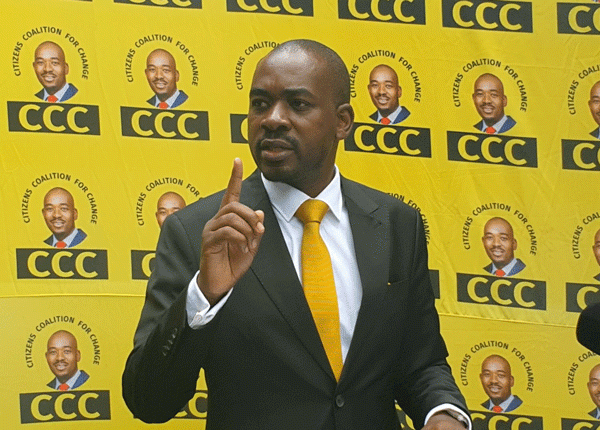
OPPOSITION parties have lost hope of the country holding free and fair elections next year in the absence of electoral reforms.
Some of the political parties have predicted a disputed poll as government drags its feet on implementing electoral reforms.
Citizens Coalition for Change (CCC) party leader Nelson Chamisa yesterday made a passionate plea to the Southern African Development Community (Sadc) to stand in solidarity with the opposition party in its call for electoral reforms, which he said would help resolve the regional migration crisis.
In an open letter to Sadc, Chamisa said the emigration crisis facing Zimbabwe would continue affecting other countries in the region if the Zimbabwean governance crisis remains unresolved.
“Zimbabwe has been a burden to her neighbours for far too long,” Chamisa wrote.
“It is time we changed this. This all starts with solving the governance crisis, once and for all. We need reforms. We must prepare and have a pre-election pact on electoral and political reforms. Our call to our neighbours is this; we appreciate your benevolence and patience, but you should not have to carry this burden any longer than you already have.
“Help us to hold credible elections. We are encouraged that President Cyril Ramaphosa has said the immigration crisis will be discussed at regional level. Now, more strongly than ever, Sadc must demand reforms. We do not ask for anything new; only that Zimbabwe holds elections that meet already existing Sadc guidelines. This, more than shaming the innocent victims of misrule, is what will solve the crisis,” Chamisa said.
Other political party leaders said government had failed to implement the necessary reforms in the past four years, which prompted them to have doubts on the possibility of authorities achieving it in less than the 12 months left before the next election.
- Chamisa party defiant after ban
- Village Rhapsody: How Zimbabwe can improve governance
- News in depth: Partisan police force persecutes opposition, shields Zanu PF rogue elements
- Chamisa chilling death threat bishop defiant
Keep Reading
They were speaking during a virtual discussion on analysis of critical electoral reforms for 2023 general elections, which was hosted by the Zimbabwe Election Support Network on Wednesday.
Opposition parties have complained about lack of independence of the Zimbabwe Electoral Commission (Zec) and its failure to avail a credible voters roll, among others.
Gweru Urban MP Brian Dube (MDC-T) said some of the reforms could be implemented immediately, but government had dragged its feet to walk the talk since the 2018 election.
“The electoral reforms can be done through the legislative processes and for the law to be passed, it does not take ages as long as there is will, it can take up to two weeks,” he said.
“Zimbabweans already know what they want, a balanced and independent Zec that is demilitarised so that all those soldiers, the security sectors that comprise the electoral body, are removed. We should agree on the constitutional amendments. Those do not require years to be done. It’s only that there is no political will and intention to hold a free and fair election in Zimbabwe.”
ZimFirst party secretary-general Tafadzwa Tom added: “There are no two ways about electoral reforms, they are needed urgently. If the call for reforms is ignored, after the election there will still be talks of electoral reform. There is need for reforms for ... a level ground. The electoral law should be amended.”
Political party leaders also implored Zec to fulfil the citizens’ right to vote on some disenfranchised groups which include those in hospitals, prisons and in the diaspora.
CCC deputy secretary for elections Ellen Shiriyedenga said: “As far as we are concerned from the CCC point of view, no discussions with regards to the electoral reforms have been done, particularly looking at the stakeholder engagement processes, the multiparty committees and also even the public discussions.
“The only thing that we have seen is the poll survey when Zec was engaging the public with regards to their views on registration of political parties. We have written to Zec several times with regards to the issue of electoral reforms.”
Labour Economists and African Democratic Party leader Linda Masarira said: “Extending the right to vote is something that we have also been advocating for for a very long time, especially for the population in prison which is always short-changed and those who will be in hospitals during the election time.”
Academic Ibbo Mandaza said although Sadc could play a role in resolving the problems Zimbabwe was facing, Parliament was one underutilised institution.
“Appeals to Sadc and the regional bodies are also important, but historically, Sadc did little or nothing about the Zimbabwean situation given the declining influence and status of the regional organisation, more than a graphic illustration of the sordid conditions in which Zimbabwe finds itself, economically, politically and socially,” he said.
“Parliament is one key institution which can be used to resolve the problem. We have opposition MPs in Parliament. What are they doing to push for electoral reforms in that House?”
Political analyst Eldred Masunungure described Chamisa’s plea to Sadc as “symbolic”.
He said: “I do not think those regional bodies have much appetite to involve themselves in the Zimbabwean situation. Such calls for solidarity can be made symbolic so that at least they can say they did something in their call for reforms.”
Follow Miriam on Twitter @FloMangwaya










